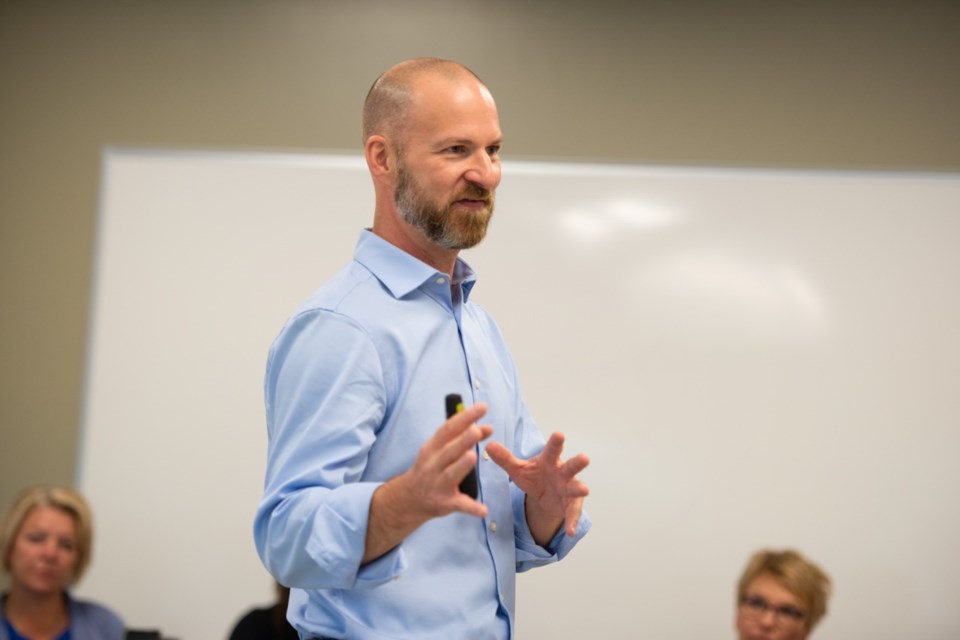Energy Safety Canada brought in Paul Krismer on Sept. 11 for a session on positive thinking in the workplace, held at С����Ƶeast College in Weyburn.
Krismer used to work with Worksafe B.C., where, he noted, “If you’re a really poor performer, we should put you out of business.”
“If it’s not in people’s hearts, you don’t have a great energy program,” he said, noting people who gripe are the most likely to get hurt, and the most likely to stay the longest on a claim.
To that end, Krismer said you should isolate “negative energy leaders,” and “encourage positive energy leaders.”
Weyburn Mayor Marcel Roy, a retired police officer and someone who runs a safety business, asked if post-traumatic stress disorder (PTSD) is more prevalent among millennials.
Krismer replied that it exists in 10, 20, 100 times more volume than it did 40 years ago, not to say that it didn’t happen 40 years ago.
He likened it to attention deficit hyperactive disorder, which when the diagnosis was first crafted, was thought to affect only 15,000 kids in America. Instead, millions of children have been diagnosed.
Regarding millennials, he said, “They bring a lot of good qualities, but they’re much more fragile.” He attributed the phenomena of “helicopter parenting” and “careful management of their egos” as part of the issue.
“Every generation prior to the millennials thought their standard of living would be better than their parents,” Krismer said. But since 1976, real wages have been stagnant. In Vancouver, they will likely never own a house. “My generation – you give me money, I’ll do the work. Millennials don’t believe that.”
He said they are looking for meaningfulness at work, and that something is fundamentally shifting. More and more older workers are insisting on meaningfulness, too.
On the topic of positivity, Krismer said a big predictor of staff retention is if an employee has a close friend within the organization. “Watercooler talk is hugely important,” he said, noting it creates psychological capital.
To this end, he referred to the escalating hierarchy of needs. First there are basic needs, like pay and employment. Then there’s safety. The third level is belonging. He noted we are tribal animals.
The fourth level is appreciation, and the last is autonomy, С����Ƶ able to handle one’s own problem solving.
“People need to feel appreciated and belonging at work,” he said.
“When people feel a sense of autonomy, especially professionals and highly trained tradespeople, this is huge for them. They want to be bringing their own creative professionalism to the workplace. They want to be agents for change in their own lives.”
One of the issues these days is mindfulness – paying attention to the job at hand, as opposed to having one’s eyes on their cellphone. He noted that attention spans are getting shorter.
Mindfulness is something that can be taught, however. That includes meditation and something he referred to as “queuing.”
“Success and happiness are highly correlated. If you find one, you find the other,” Krismer said. “It’s not success first, it’s happiness first, and success follows.
Happy people are literally smarter, he noted. They also see more, which has safety implications.
Happiness is highly predictive and causative, he noted.
“Positive emotions lead to more success in life,” according to Krismer.
He said it is a learnable skill. “First we need to overcome the negativity bias. Things that make us feel bad, we learn hard and fast,” he said. That’s a self-preservation trait.
“We have been programmed, genetically, to be running 24/7 from threats. It’s part of our genetic heritage.”
This can be overcome with positive offsets.
There’s some math to all this. He noted that a 3:1 positive ratio for a sales team results in better performance. The best ratio was 5.9:1.
One way to inspire positivity is simply asking the question, “What’s going well?” but he acknowledged that focusing on that can be difficult.
“It’s simply asking, ‘What are you grateful for?’”
That can be one of the most powerful interventions, Krismer said.
“Every day, look at your past 24 hours, and write down three things that went well. Do it at the same time every day,” he said.
Doing this “automates” happiness, training the brain to look for things that went well.
He gave an example of a British Columbia company that saw a 92 per cent reduction of unsafe behaviour within weeks, due to talking about safety. That company had previously had an atrocious safety record.
He noted CEOs of companies don’t own the culture, it’s the frontline workers that do. And front line leaders make a difference.




